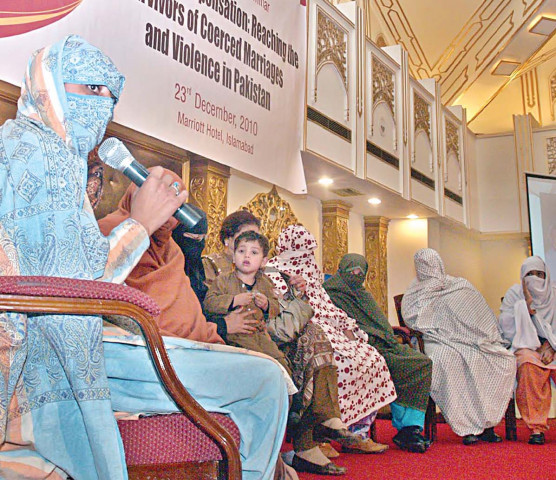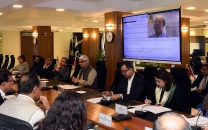Swara – a life of brutal slavery
Swara is the blood marriage, which takes place between two families to end a family feud.

She shared her experience along with nine other such victims from Mardan and Swabi at a seminar on “Women as compensation: Reaching the survivors of coerced marriages and violence in Pakistan,” organised by Rahnuma-Family Planning Association of Pakistan (FPAP) at the end of its two years project to sensitise people against the barbaric custom of Swara and to provide reproductive health services to them. The event was held here at a local hotel on Thursday.
“I was handed over to a man who was mentally ill as a compensation by my uncle who used to beat me every day,” said another victim who does not want her name to be mentioned.
Swara is the blood marriage, which takes place between two families to end a family feud. The girl, who is sometimes not more than four or five years, is handed over to the enemy family against whom the men folk of the girl’s family have committed some crime. The innocent girl pays the price for the criminal act of the men in her family, who thus escape punishment.
The seminar participants explained that the girl who is given in Swara loses all her rights as an individual and the custom gives her no protection of any kind.
Although these girls are given away under the pretence of marriage, they are treated as worse than slaves in the family of the in-laws throughout their lives. They are abused in many ways and their human rights are grossly violated.
Saiqa Usman, Counsellor of the project, informed the audience that Swara victims are imprisoned in the house where they live and have no freedom of movement. They cannot go outside the house even for medical treatment and are socially isolated. They are not allowed to talk to outsiders. Bringing some of these women to participate in the seminar in the capital had been a very difficult task. The tragedy was that if anyone of them ever succeeded in escaping from captivity they found no place in society and no social or economic support.
Member National Assembly Palwasha Khan and Justice (Retd) Fakhrun Nisa said extrajudicial systems were not always as bad as they were considered: such systems were prevalent in other countries also. But no civilised society could allow such inhuman practices even in the name of religion or feudal customs. The Swara victims were praised for their bravery and urged to stand up for their rights and against such barbaric customs.
The speakers said that women need to be educated and made aware of their rights. They should market their skills for an independent income which will bring them empowerment.
Syed Kamal Shah, CEO of FPAP, said lack of legislation in the society also created problems for the victims as there was no specific legislation to bring the perpetrators to book. He said there was also no legislation for under-age marriages and a fine of only Rs1000 was imposed on the perpetrator.
Published in The Express Tribune, December 25th, 2010.



















COMMENTS
Comments are moderated and generally will be posted if they are on-topic and not abusive.
For more information, please see our Comments FAQ